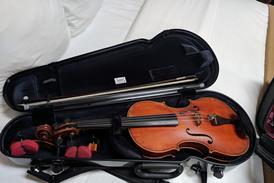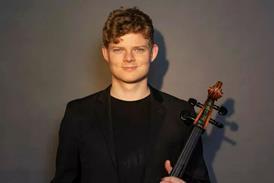Violist Matthew Jones discusses the ways in which meditation and mindfulness can help performers

My exposure to meditation, through a long period of injury some 20 years ago, made me aware of the huge array of benefits to musicians, both at and away from the instrument. It helps to promote peace, balance and calm in the musician’s life (which is often hectic, overwhelming and stressful). It offers practical tools to aid with pretty much any situation, not least to find a centred, focused place in oneself just before, or during, a performance. The form I now teach, Kundalini meditation, helped me enormously in my recovery from injury and brings me ever closer to my goal of transmitting music in performance without resistance and to managing my energy in the complex balance of performing, teaching and family life.
When we meditate, we become able to direct our attention and balance our sensitivities, to become aware of the connections between stimulus and reaction, mind and body, and to feel more at peace with ourselves and whatever or whomever may be around us.
Here are Jones’s three tips for using meditation techniques to improve musical performance
1.Focus on breathing
One of the very simplest breath-meditation techniques to use before a performance can help to counterbalance unwanted effects of the ‘stress’ or ‘fight/flight response’ – ‘2:1 breathing’ for 3-5 minutes. In a calm seated position (or if you have no space, standing is fine!), breathing only through the nose, gradually make the exhale twice as long as the inhale, as slow and deep as is comfortable without forcing the breath or tensing the shoulders. I use this, as well as a Kundalini meditation named ‘Kirtan Kriya’, before every performance, and have found these simple practices transformational.
2. Practise mindfulness
The practice of bringing one’s attention to the internal and external experiences occurring in the present moment, has become popular with, and proved enormously beneficial for, musicians in recent years. As simple a practice as a brief walking meditation while entering the stage can alter a performance significantly.
Similarly, choosing where to direct our attention during a performance can bring great changes - whether we choose this focus to be the emotion we are expressing with a phrase, the awareness of the floor, the quality of the sound or the depth of our breath.
3. Use silence
In performance the heightened state of awareness changes our instinctive sense of the passage of time in a small but significant way (amongst many other changes). Silences (whether pauses, written bars of silence or gaps between movements) are almost always shorter than we perceive them, and chosen tempos are often up to 5% faster (even 10% in some cases) to the point that the total musical part of a recital is often several minutes shorter than a pre-concert run-through.
The use of these silences to bring ourselves back to the present moment can reduce the tendency to rush and any associated panic (though it is always advisable to practise fast passages up to 10% faster than final tempo so the mind cannot question your ability to play it under stress).
This is part of a longer article originally published on The Strad website in May 2016.


































No comments yet